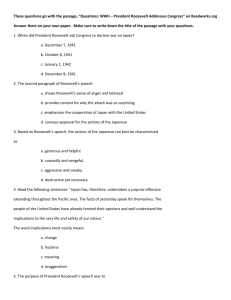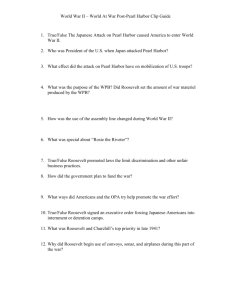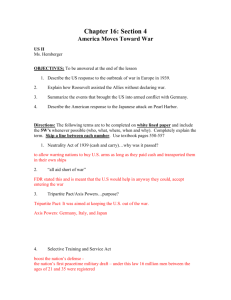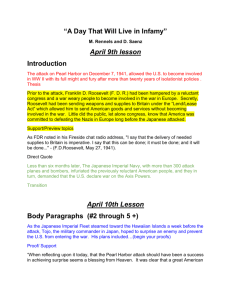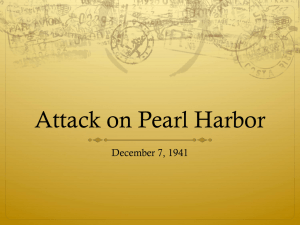writingproject1draft1 Monica
advertisement
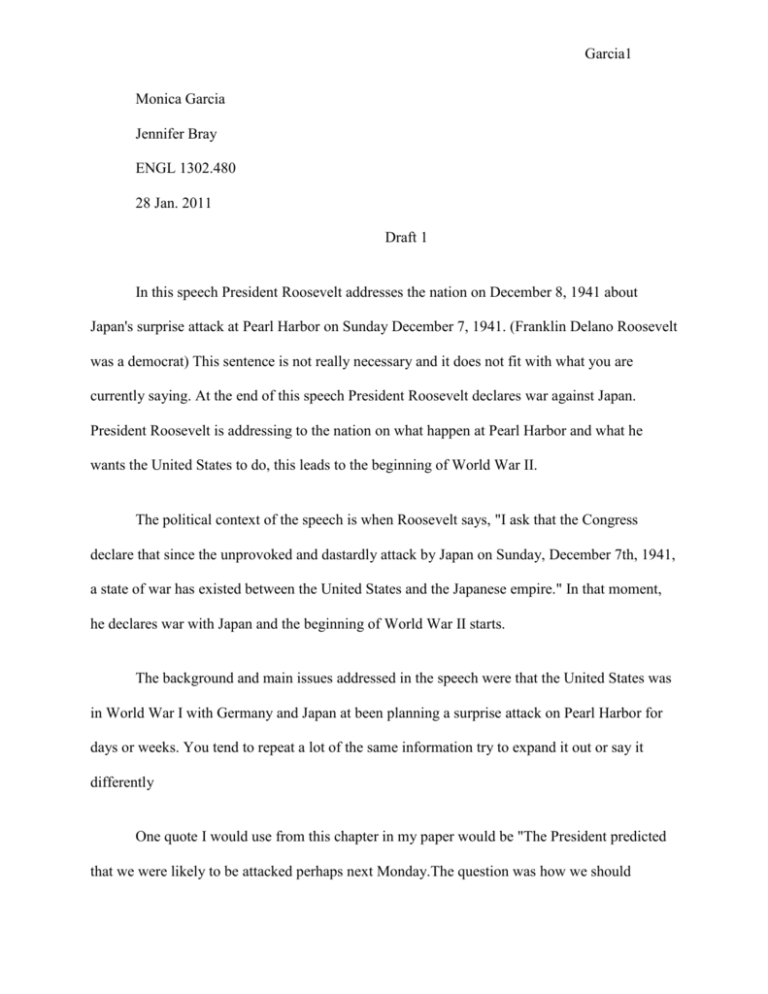
Garcia1 Monica Garcia Jennifer Bray ENGL 1302.480 28 Jan. 2011 Draft 1 In this speech President Roosevelt addresses the nation on December 8, 1941 about Japan's surprise attack at Pearl Harbor on Sunday December 7, 1941. (Franklin Delano Roosevelt was a democrat) This sentence is not really necessary and it does not fit with what you are currently saying. At the end of this speech President Roosevelt declares war against Japan. President Roosevelt is addressing to the nation on what happen at Pearl Harbor and what he wants the United States to do, this leads to the beginning of World War II. The political context of the speech is when Roosevelt says, "I ask that the Congress declare that since the unprovoked and dastardly attack by Japan on Sunday, December 7th, 1941, a state of war has existed between the United States and the Japanese empire." In that moment, he declares war with Japan and the beginning of World War II starts. The background and main issues addressed in the speech were that the United States was in World War I with Germany and Japan at been planning a surprise attack on Pearl Harbor for days or weeks. You tend to repeat a lot of the same information try to expand it out or say it differently One quote I would use from this chapter in my paper would be "The President predicted that we were likely to be attacked perhaps next Monday.The question was how we should Garcia2 maneuver them into the position of firing the fist shot" This quotation has been made much of by those trying to prove conspiracy between F.D.R and his cabinet to get us into war." According to this quote many people believed that President Roosevelt wanted the United States to go into War with Japan, that is why he did not let Hawaii know of the spies being reported and clues of the attack before December 7th. This information in this quote is important because it leaves some people to wonder if the attack on Pearl Harbor was a surprise or a motive to begin a war with Japan. How do the people feel about this? One emotional appeal that Roosevelt uses is "With confidence in our armed forces, with the unbounding determination of our people, we will gain the inevitable triumph--so help us God.” In this quote he is trying to convince the nation that with the help of God the U.S will overcome this tragedy and triumph in victory. Another emotional appeal would be at the beginning of his speech when he says, “Yesterday, December 7th, 1941--a date which will live in infamy--the United States of America was suddenly and deliberately attacked by naval and air forces of the Empire of Japan. One example of a logical appeal would be "The attack yesterday on Hawaiian islands has caused severe damage to American naval and military forces. I regret to tell you that very many American lives have been lost. In addition, American ships have been reported torpedoed on the high seas between San Francisco and Honolulu.” In this sentence President Roosevelt is informing the nation that many American lives were lost in the attacked at Pearl Harbor. I believe many American felt a sense of sympathy and sorrow when President Roosevelt said these words. Garcia3 Another example of a logical appeal is when Roosevelt says. “As commander in chief of the Army and Navy, I have directed that all measures be taken for our defense. But always will our whole nation remember the character of the onslaught against us.” In this quote I think that he is trying to give the nation a sense of hope that America will attacked back at Japan and over come this tragedy. President Roosevelt uses repetition in his "Pearl Harbor Address to the Nation" when he says, "Yesterday, the Japanese government also launched an attack against Malaya. Last night, Japanese forces attacked Hong Kong. Last night, Japanese forces attacked Guam. Last night, Japanese forces attacked the Philippines Islands. Last night, the Japanese attacked Wake Island. And this morning, the Japanese attacked Midway Island.” I think that he uses the rhetorical device “repetition” to make it clear that the in one night; the nation was change in a dramatic way that would take years to rebuild and recover from. Good paragraph Writers tone is formal. Writer does have a works cited page. The paper could be improved if the writer expands the information she has and talk more about how the people feel about this situation. Garcia4 Works Cited Brinkley, Alan. Franklin Delano Roosevelt. Oxford: Oxford University Press, 2010. Print. Borg, Dorothy, and Shumpei Okamoto. Pearl Harbor as History: Japanese-American Relations, 1931-1941. New York: Columbia University Press, 1973. Print. Dan Reiter and John M. Schuessler. "FDR, U.S. Entry into World War II, and Selection Effects Theory." International Security 35.2 (2010): 176-185. Project MUSE. Web. 21 Jan. 2011. Roosevelt, Frankin D. "Pearl Harbor Address to the Nation." American Rhetoric: The Power of Oratory in the United States. Michael E. Eidenmuller. Web. 25 Jan. 2011. Schuessler M. John. "The Deception Dividend: FDR's Undeclared War." International Security 34.4 (2010): 133-165. Project MUSE. Web. 21 Jan. 2011. Garcia5 Waller, George M. Pearl Harbor: Roosevelt and the Coming of the War. Lexington, Mass: Heath, 1976. Print. Workman, Andrew A. "Creating the National War Labor Board: Franklin Roosevelt and the Politics of State Building in the Early 1940s." Journal of Policy History 12.2 (2000): 233264. Project MUSE. Web. 21 Jan. 2011. Edited by Kristy Rincon
